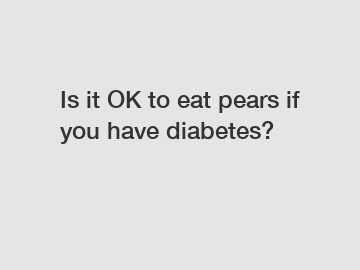Is it OK to eat pears if you have diabetes?
Pears are a delicious and nutritious fruit enjoyed by many people around the world. However, for individuals with diabetes, it may be a concern when considering their fruit choices. People with diabetes must carefully monitor their carbohydrate intake to manage their blood sugar levels effectively. In this article, we will explore whether it is okay to eat pears if you have diabetes and how they can be incorporated into a diabetes-friendly diet.
## Nutritional Benefits of Pears.
Pears are packed with essential vitamins, minerals, and fiber that provide numerous health benefits. They are a good source of vitamin C, potassium, and antioxidants. Pears also contain dietary fiber, which can aid in digestion, regulate blood sugar levels, and promote feelings of fullness.

### Fiber Content.
The high fiber content in pears can be beneficial for individuals with diabetes. Fiber helps slow down the absorption of sugars in the bloodstream, preventing spikes in blood sugar levels. This can be particularly beneficial for those with diabetes, as it can help improve glucose control and overall insulin sensitivity.
### Glycemic Index of Pears.
The glycemic index (GI) is a measure of how quickly a food raises blood sugar levels. Foods with a low GI are digested and absorbed more slowly, leading to a gradual increase in blood sugar levels. Pears have a relatively low GI, which means they have a minimal impact on blood sugar levels. This makes them a suitable choice for individuals with diabetes.
### Portion Control.
While pears can be a healthy addition to a diabetes-friendly diet, it is essential to practice portion control. Eating too much fruit, including pears, in one sitting can lead to a rapid increase in blood sugar levels. It is recommended to consume moderate portions of fruit and pair them with protein or healthy fats to help stabilize blood sugar levels.
## Incorporating Pears into a Diabetes-Friendly Diet.
Including pears in a well-balanced diet can provide a range of health benefits for individuals with diabetes. Here are some tips for incorporating pears into a diabetes-friendly meal plan:
### Pairing with Protein.
Pairing a serving of pear with a protein source, such as Greek yogurt or nuts, can help balance blood sugar levels and promote satiety. The combination of carbohydrates, fiber, and protein can provide a steady release of energy and prevent blood sugar spikes.
### Choosing Whole Pears.
Instead of opting for processed forms of pears, such as canned or dried varieties, choose whole, fresh pears. Whole pears contain more fiber and essential nutrients, making them a healthier choice for individuals with diabetes.
### Monitoring Blood Sugar Levels.
It is crucial for individuals with diabetes to monitor their blood sugar levels regularly, especially after consuming high-carbohydrate foods like pears. This can help determine how different foods affect blood sugar levels and guide future food choices.
In conclusion, pears can be a nutritious and diabetes-friendly fruit option when consumed in moderation and as part of a well-balanced diet. Incorporating pears into a diabetes meal plan can provide essential nutrients, fiber, and antioxidants that support overall health. If you have diabetes and are unsure about including pears in your diet, consult with a healthcare provider or registered dietitian for personalized guidance.
If you have any questions or concerns about including pears in your diabetes meal plan, please do not hesitate to contact us.
The company is the world’s best Snow Pear for Sale, How to Ripen Pears Naturally, Quickly Ripen Pears supplier. We are your one-stop shop for all needs. Our staff are highly-specialized and will help you find the product you need.
192
0
0

Comments
All Comments (0)